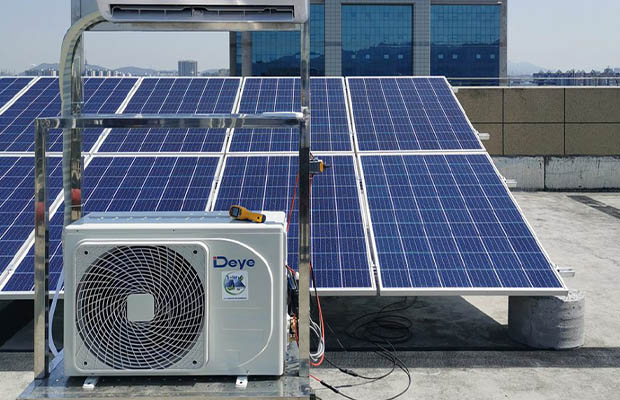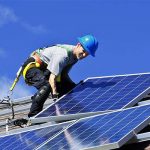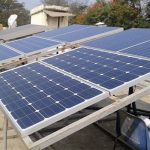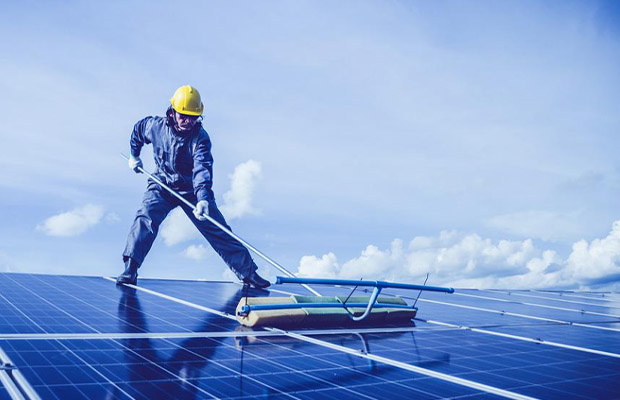At least half of the energy needed to run your air conditioner can come from solar power.
You won’t need to use the grid very much if a system has more panels and a bigger battery, for example.
If a significant portion of your domestic energy consumption is spent cooling your home, you should think about installing a solar air conditioner.
Utilizing the sun’s free energy to run solar-powered air conditioners allows you to keep your home at the perfect temperature while saving money on utility costs. Learn more about solar air conditioning by continuing to read.
Table of Contents
- Heavy Environmental Cost Of Air Conditioning
- Why Do We Need Solar Air Conditioner?
- Benefits Of Solar Air Conditioning
- How Does Solar Air Conditioner Work?
- Types Of Solar Powered Air Conditioner
- Things To Consider When Shifting To Solar Air Conditioner
- Cost And Value
- How Much Money Can I Save With Solar Air Conditioner?
- Final: Is Solar Air Conditioner Worthwhile?
Heavy Environmental Cost Of Air Conditioning
The amount of money Americans spend annually on cooling their homes is staggering.
Energy.gov estimates that as much as $11 billion of our hard-earned salaries goes toward powering air conditioners.
It should come as no surprise that the average annual cost to operate an air conditioner is close to $300 per household, given that approximately 87 percent of us have them in our homes.
The high energy requirements of air conditioning are bad for the environment as well as our individual finances.
An estimated 140 million tons of carbon dioxide are produced annually in the United States alone due to the extensive energy use of air conditioning.
At a time when efforts to achieve carbon neutrality are at the forefront of both domestic and international policy (this includes you, Canada…).
Solar air conditioners could be the answer to the enormous energy consumption needed to complete the seemingly simple task of keeping us cool in our homes.
Why Do We Need Solar Air Conditioner?
According to energy.gov, 75% of US homes use air conditioning, which accounts for 6% of all electricity use, costs $29 billion annually, and emits 117 million metric tons of carbon dioxide! This highlights the critical need for solar-powered air conditioners! By switching to solar-powered, cost-effective air conditioning, you can lessen your impact on the environment and save a lot of money.
As of now, solar energy will only supply 2.4% of all electricity used in 2020. It can be a great first step in the fight against the current climate crisis to switch to solar-powered central air conditioning or to install solar-powered windows or portable air conditioners.
Benefits Of Solar Air Conditioning
Solar panel air conditioners offer a number of benefits. They have a high initial investment requirement, which is the only drawback.
1. Increases The Value Of Your Property
Solar panel air conditioners have advantages for the environment as well as the ability to raise the value of your house. Homes with solar air conditioning are in higher demand and command higher prices.
2. Saves On Bills
Depending on your climate, solar-powered AC units may still require you to use electricity from the main power grid, but your usage will be reduced by up to 50%. Consequently, you can significantly reduce your AC bills by using solar power. This also aids in offsetting the solar panels’ high initial installation costs.
3. Reduces The Energy Demand
In summer, conventional AC systems running on the hottest days can overload the electrical grid and cause power outages. Because they divert load from the primary grid, solar air conditioners are especially beneficial because they reduce demand during periods of peak usage. This may lessen the frequency of power blackouts and brownouts.
4. No Greenhouse Gas Emissions
The use of solar-powered air conditioning systems lessens reliance on fossil fuels because solar energy is a renewable resource. As a result, less greenhouse gas is released into the atmosphere, which helps to combat global warming.
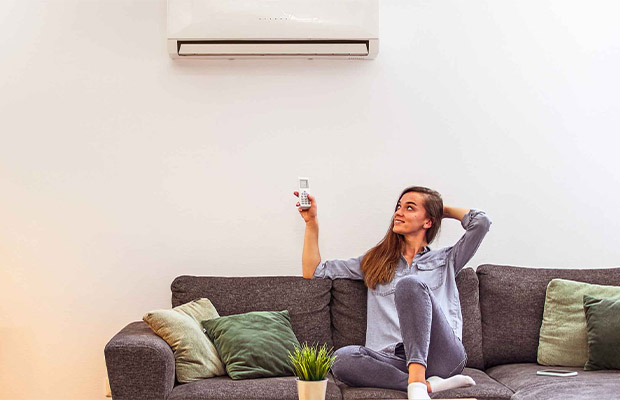
How Does Solar Air Conditioner Work?
Although many of these solar air conditioners are not yet offered in consumer markets, there are numerous varieties.
Nonetheless, three types have become common in residential buildings in the last few years:
Solar Photovoltaic (Solar PV) Air Conditioners
Solar photovoltaic panels, which are typically mounted on the roof of a building, are used in these systems to harvest the solar energy of the sun.
The solar PV panels turn this solar energy into electricity, which powers every component of a conventional split system.
Unused electricity is stored in a battery array to be used at a later time.
Furthermore, some hybrid air conditioners are wired into the power grid to give them an extra boost if the sun isn’t strong enough to charge the batteries.
Solar Thermal Systems
Solar energy is collected by these systems using a plate.
The compressor that is in charge of the air conditioning system’s refrigeration process is then powered by this energy by turning an electric generator.
Grid electricity is used by solar thermal systems to power the electric control panel and fans.
But because they use more energy than solar photovoltaic systems, this technology is quickly losing favor.
Types Of Solar Powered Air Conditioner
There are several options available, even for solar-powered air conditioners. Depending on the type of power the air conditioner receives, these vary. Let’s see them below.
- DC-Powered Solar Air Conditioners
- AC-Powered Solar Air Conditioners
- Hybrid Powered Solar Air Conditioners
1. DC Powered Solar Air Conditioners
DC solar air conditioners, also known as traditional solar-powered air conditioners, are powered by direct current (DC) electricity, which is drawn directly from the solar panels. They can operate entirely off-grid thanks to the batteries, which receive their power from solar energy. To capture sunlight and convert it into electric energy, they use solar and photovoltaic panels. This type of air conditioner provides a few major advantages, which are:
- Since a solar panel generates DC electricity, powering an air conditioner like this directly from the solar panel won’t be a problem.
- In contrast to AC-powered air conditioners, DC-powered solar air conditioners can be operated with little additional equipment expense, making them the preferred choice for completely off-the-grid living.
- Installation and upkeep are simple.
A large battery bank would be necessary to power the system at night, which is a drawback. The other choice is to run the air conditioner after converting AC electricity from the power mains to DC using a rectifier device. However, it completely defeats the purpose of a solar-powered air conditioner!
2. AC Powered Solar Air Conditioners
The solar air conditioner with Alternating Current is more well-known. You need an inverter to convert the DC generated by the solar panels into AC in order for AC air conditioners to run on solar power.
An essential component of this setup is the inverter. In addition, after going through an inverter, the solar-powered air conditioner uses up the energy that was previously stored in a battery. Due to this reason, AC-powered solar air conditioners provide the following advantages:
- These air conditioners are also capable of being connected to the grid and functioning as regular air conditioners. This air conditioner runs on AC power, so you don’t need any additional equipment.
- The main benefit of such a system is that grid power and solar power can both be used to operate it.
- If these ACs are connected to the grid, you can use a process known as net metering to give the grid any excess electricity produced and receive credit for it.
3. Hybrid Powered Solar Air Conditioners
Air conditioners that use hybrid solar power can operate seamlessly on both AC and DC at the same time. These devices have the ability to simultaneously connect to the grid and the solar panels/batteries directly. Depending on the time of day and the power load, the device can then use the appropriate power source.
- Since there is no additional hardware, such as an inverter, the overall costs are also lower.
- Both solar and grid power can be switched on and off without any difficulty.
- They are able to operate at all hours of the day and in all weather conditions.
This system’s drawback is that if your batteries aren’t charged and you installed it off-grid, it won’t function at night.
Things To Consider When Shifting To Solar Air Conditioner
Here are some things to think about when selecting a solar-powered air conditioner for your house.
1. Climate Conditions
Only a few solar panels will be needed in locations with long summers and more year-round sunlight. On the other hand, if you live somewhere with less light, you will need more solar panels and a larger backup battery to capture the energy of the sun.
2. Size Of Your Home
The amount of AC capacity needed to cool your entire house will increase as it gets bigger. Therefore, if your area is smaller, you will require more solar panels. To cover all the electric appliances in a typical home, between 10 and 20 solar panels are required.
3. Battery
It is best to buy batteries if you reside in a mild climate with little sunlight. In order to store solar energy for the night and on cloudy days, choosing batteries is a good idea if you want to completely disconnect from the grid.
Cost And Value
An attic can be kept cool and dry with the help of a small solar-powered air conditioner. Similar to an attic vent, the unit is supported by a shingle roof. These compact systems cost less than $500 and are simple to install on your own. However, the price of a solar air conditioning unit varies significantly for larger systems, depending on the unit’s type and size as well as the amount of space you need to cool.
A direct current (DC) 12,000-BTU cooling unit from HotSpot Energy can cost up to $2,000 for a 24-hour hybrid system, not including solar panels. Costing up to $1,600, six solar panels can power the cooling system. When solar power is not available, hybrid systems also rely on AC grid power, necessitating the use of AC/DC inverters. A system’s total price can exceed $6,000 when inverters, controllers, and mounting equipment are added in. Similar hybrid systems are also offered by regional or local installers as well as by SolarAir World International.
How Much Money Can I Save With Solar Air Conditioner?
Significant upfront investment is needed to install a solar air conditioning system.
However, the money you save on energy bills will eventually outweigh the cost of installing solar panels, battery arrays, converters, and wiring at your home.
Your overall savings will depend on a number of variables.
- First, the percentage of an air conditioning system’s energy needs that can be met by solar power depends on the number, size, and energy-capture abilities of the solar panels. A hybrid solar system is still connected to the grid.
- Second, it’s crucial to consider the battery array’s size and carrying capacity. In recent years, battery technology has advanced significantly. Simply put, the more solar energy your battery can store, the more it can be used to supplement the energy requirements of your air conditioning system.
- Third, the amount you can save will obviously depend on how frequently you use the air conditioner. A system that can run for longer will be necessary in hotter climates. However, the greater amount of sunlight that can be harvested should partially offset these requirements. It might not be necessary to use a hybrid solar system.
Final: Is Solar Air Conditioner Worthwhile?
AC units that run on solar energy have the potential to revolutionize the industry. Powering with solar energy is becoming easier every year thanks to modern, efficient air conditioners.
Solar powered air conditioners are an excellent option for heating and cooling needs when taking into account environmental advantages, energy savings, and tax credits.
Read More: Solar Panel Repair And Maintenance

